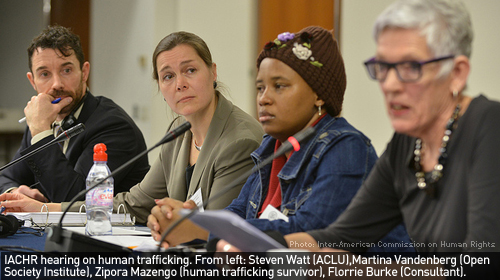
U.S. officials have acknowledged that human trafficking is a problem of "crisis proportions," both outside and inside America's borders. Yet despite professed intent to end this scourge, including with the help of a "zero-tolerance, one strike approach," human trafficking remains a pervasive and ongoing problem in this nation. As part of ongoing efforts to combat the phenomenon, the └╧░─├┼┐к╜▒╜с╣√ and a coalition of anti-trafficking organizations submitted a written statement last week to the , urging the U.S. government to translate its words into actions.
The statement was submitted on the heels of a entitled "Measures on Human Trafficking in the United States" before the . In his testimony, the └╧░─├┼┐к╜▒╜с╣√'s Steven Watt commended recent efforts by the U.S. government to close loopholes that enable human trafficking on federal government contracts, such as an on human trafficking and a provision in the , which codifies many of these essential protections. Still, Watt cautioned:
This legislation and the E.O. are important first steps to ending trafficking on government overseas contracts. Together they improve oversight of the contracting process and allow for more effective enforcement of anti-trafficking laws and policies. However, they will only achieve their objectives if properly implemented.
As the └╧░─├┼┐к╜▒╜с╣√ and Yale Law School documented in our 2011 report, Victims of Complacency, since 2003 thousands of foreign workers (known as Third Country Nationals or "TCNs") hired to work on U.S. government contracts in Iraq, Afghanistan and elsewhere have been subjected to illegal recruitment, trafficking, and forced labor, in stark violation of U.S. and international law. Disturbingly, although these abuses are well known, the U.S. government has utterly failed to hold those responsible accountable: in fact, in the past decade the government has yet to prosecute one single contractor for involvement in trafficking and forced labor.
In our submission to the FAR Council, we recommend the adoption of standards essential to ensuring better oversight of the government contract process so that trafficking does not occur. These include the elimination of recruitment fees, which place workers in a situation of debt bondage and make them more vulnerable to abuse by their employers; provision of written contracts to workers and use only of licensed recruitment agencies; the implementation of grievance procedures so that workers are able to report violations without fear of retaliation; independent verification to ensure recruitment of TCNs follows ethical guidelines; training programs to educate contractors about human trafficking; and the development of a wage compliance program to verify that employees are actually paid the wage they are promised.
Implementation of regulations incorporating these standards is vital to ensuring that the executive order and the new statutory provision are not empty promises. As Watt said before the Inter-American Commission hearing on trafficking, "Only then, will the government's oft touted zero-tolerance on trafficking become a reality for TCNs working for the government and the American public."
Learn more about human trafficking and other civil liberty issues: Sign up for breaking news alerts, , and .

